Social Psychology PY3102: Reflective Essay on Milgram's Experiment
VerifiedAdded on 2022/10/16
|7
|1717
|312
Essay
AI Summary
This essay provides a reflection on Stanley Milgram's famous obedience experiment, conducted to explore the conflict between obedience to authority and personal conscience. The essay summarizes the experiment's methodology, results, and the various versions conducted to observe different influences on obedience. The action section details a tutorial activity where students discussed the experiment's ethics and relevance, including comparisons to events like World War II. The essay also considers Milgram's Agency Theory and the ethical implications of the experiment, including whether the experiment was ethical or not. The reflective part discusses the experiment's significance in law enforcement and its impact on the participants. Overall, the essay highlights the experiment's impact on social psychology and the complexities of human behavior under pressure, especially when faced with authority.
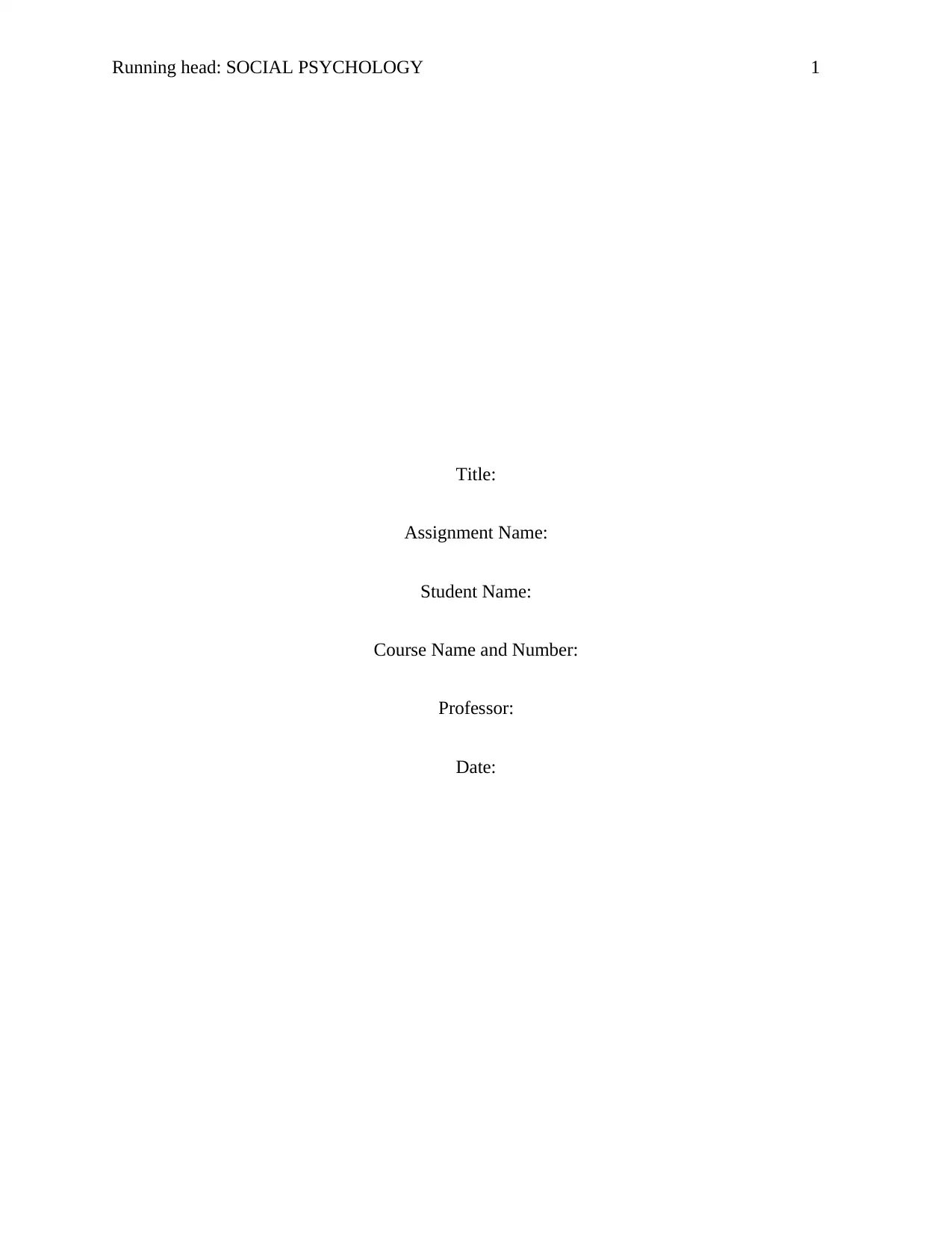
Running head: SOCIAL PSYCHOLOGY 1
Title:
Assignment Name:
Student Name:
Course Name and Number:
Professor:
Date:
Title:
Assignment Name:
Student Name:
Course Name and Number:
Professor:
Date:
Paraphrase This Document
Need a fresh take? Get an instant paraphrase of this document with our AI Paraphraser
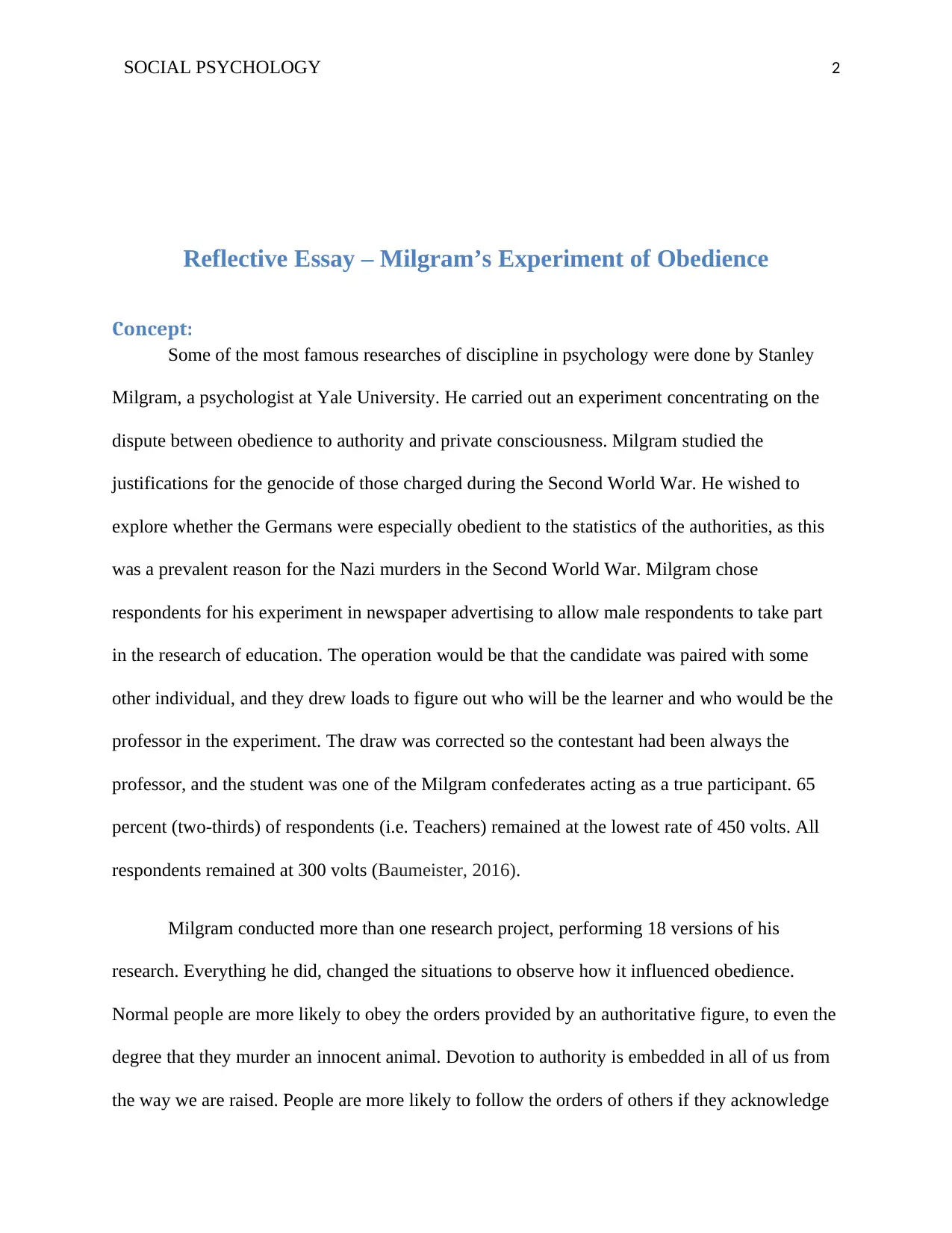
SOCIAL PSYCHOLOGY 2
Reflective Essay – Milgram’s Experiment of Obedience
Concept:
Some of the most famous researches of discipline in psychology were done by Stanley
Milgram, a psychologist at Yale University. He carried out an experiment concentrating on the
dispute between obedience to authority and private consciousness. Milgram studied the
justifications for the genocide of those charged during the Second World War. He wished to
explore whether the Germans were especially obedient to the statistics of the authorities, as this
was a prevalent reason for the Nazi murders in the Second World War. Milgram chose
respondents for his experiment in newspaper advertising to allow male respondents to take part
in the research of education. The operation would be that the candidate was paired with some
other individual, and they drew loads to figure out who will be the learner and who would be the
professor in the experiment. The draw was corrected so the contestant had been always the
professor, and the student was one of the Milgram confederates acting as a true participant. 65
percent (two-thirds) of respondents (i.e. Teachers) remained at the lowest rate of 450 volts. All
respondents remained at 300 volts (Baumeister, 2016).
Milgram conducted more than one research project, performing 18 versions of his
research. Everything he did, changed the situations to observe how it influenced obedience.
Normal people are more likely to obey the orders provided by an authoritative figure, to even the
degree that they murder an innocent animal. Devotion to authority is embedded in all of us from
the way we are raised. People are more likely to follow the orders of others if they acknowledge
Reflective Essay – Milgram’s Experiment of Obedience
Concept:
Some of the most famous researches of discipline in psychology were done by Stanley
Milgram, a psychologist at Yale University. He carried out an experiment concentrating on the
dispute between obedience to authority and private consciousness. Milgram studied the
justifications for the genocide of those charged during the Second World War. He wished to
explore whether the Germans were especially obedient to the statistics of the authorities, as this
was a prevalent reason for the Nazi murders in the Second World War. Milgram chose
respondents for his experiment in newspaper advertising to allow male respondents to take part
in the research of education. The operation would be that the candidate was paired with some
other individual, and they drew loads to figure out who will be the learner and who would be the
professor in the experiment. The draw was corrected so the contestant had been always the
professor, and the student was one of the Milgram confederates acting as a true participant. 65
percent (two-thirds) of respondents (i.e. Teachers) remained at the lowest rate of 450 volts. All
respondents remained at 300 volts (Baumeister, 2016).
Milgram conducted more than one research project, performing 18 versions of his
research. Everything he did, changed the situations to observe how it influenced obedience.
Normal people are more likely to obey the orders provided by an authoritative figure, to even the
degree that they murder an innocent animal. Devotion to authority is embedded in all of us from
the way we are raised. People are more likely to follow the orders of others if they acknowledge
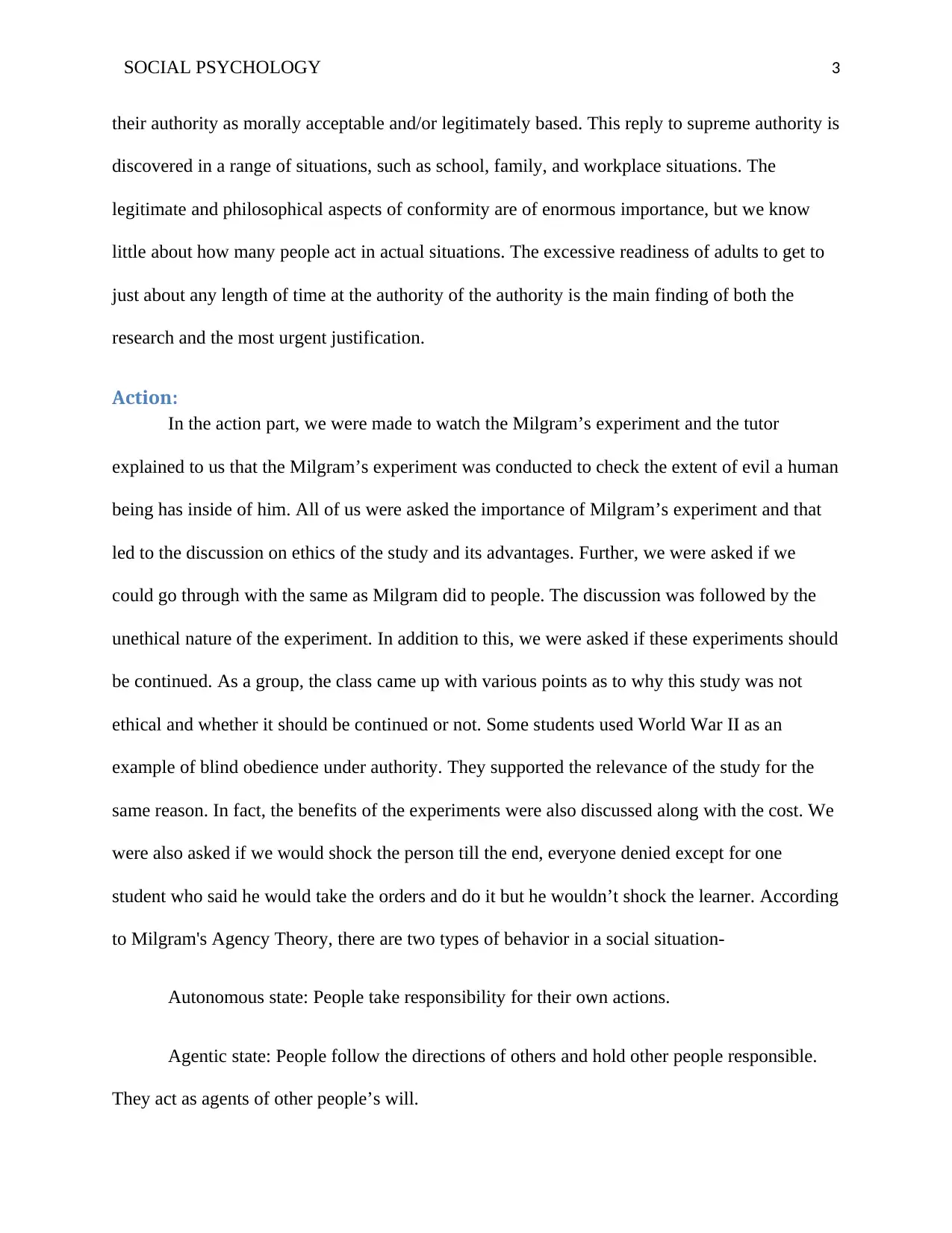
SOCIAL PSYCHOLOGY 3
their authority as morally acceptable and/or legitimately based. This reply to supreme authority is
discovered in a range of situations, such as school, family, and workplace situations. The
legitimate and philosophical aspects of conformity are of enormous importance, but we know
little about how many people act in actual situations. The excessive readiness of adults to get to
just about any length of time at the authority of the authority is the main finding of both the
research and the most urgent justification.
Action:
In the action part, we were made to watch the Milgram’s experiment and the tutor
explained to us that the Milgram’s experiment was conducted to check the extent of evil a human
being has inside of him. All of us were asked the importance of Milgram’s experiment and that
led to the discussion on ethics of the study and its advantages. Further, we were asked if we
could go through with the same as Milgram did to people. The discussion was followed by the
unethical nature of the experiment. In addition to this, we were asked if these experiments should
be continued. As a group, the class came up with various points as to why this study was not
ethical and whether it should be continued or not. Some students used World War II as an
example of blind obedience under authority. They supported the relevance of the study for the
same reason. In fact, the benefits of the experiments were also discussed along with the cost. We
were also asked if we would shock the person till the end, everyone denied except for one
student who said he would take the orders and do it but he wouldn’t shock the learner. According
to Milgram's Agency Theory, there are two types of behavior in a social situation-
Autonomous state: People take responsibility for their own actions.
Agentic state: People follow the directions of others and hold other people responsible.
They act as agents of other people’s will.
their authority as morally acceptable and/or legitimately based. This reply to supreme authority is
discovered in a range of situations, such as school, family, and workplace situations. The
legitimate and philosophical aspects of conformity are of enormous importance, but we know
little about how many people act in actual situations. The excessive readiness of adults to get to
just about any length of time at the authority of the authority is the main finding of both the
research and the most urgent justification.
Action:
In the action part, we were made to watch the Milgram’s experiment and the tutor
explained to us that the Milgram’s experiment was conducted to check the extent of evil a human
being has inside of him. All of us were asked the importance of Milgram’s experiment and that
led to the discussion on ethics of the study and its advantages. Further, we were asked if we
could go through with the same as Milgram did to people. The discussion was followed by the
unethical nature of the experiment. In addition to this, we were asked if these experiments should
be continued. As a group, the class came up with various points as to why this study was not
ethical and whether it should be continued or not. Some students used World War II as an
example of blind obedience under authority. They supported the relevance of the study for the
same reason. In fact, the benefits of the experiments were also discussed along with the cost. We
were also asked if we would shock the person till the end, everyone denied except for one
student who said he would take the orders and do it but he wouldn’t shock the learner. According
to Milgram's Agency Theory, there are two types of behavior in a social situation-
Autonomous state: People take responsibility for their own actions.
Agentic state: People follow the directions of others and hold other people responsible.
They act as agents of other people’s will.
⊘ This is a preview!⊘
Do you want full access?
Subscribe today to unlock all pages.

Trusted by 1+ million students worldwide
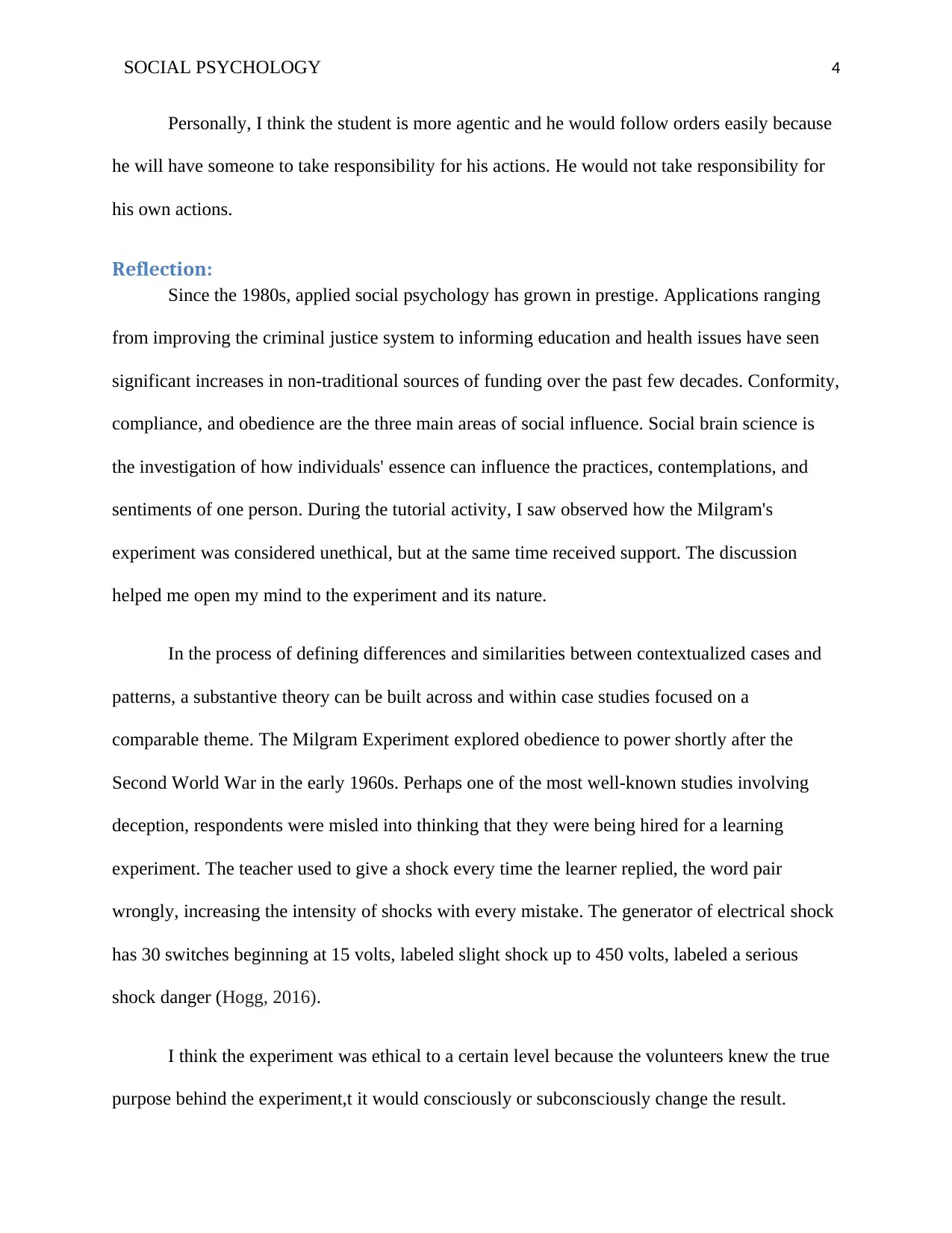
SOCIAL PSYCHOLOGY 4
Personally, I think the student is more agentic and he would follow orders easily because
he will have someone to take responsibility for his actions. He would not take responsibility for
his own actions.
Reflection:
Since the 1980s, applied social psychology has grown in prestige. Applications ranging
from improving the criminal justice system to informing education and health issues have seen
significant increases in non-traditional sources of funding over the past few decades. Conformity,
compliance, and obedience are the three main areas of social influence. Social brain science is
the investigation of how individuals' essence can influence the practices, contemplations, and
sentiments of one person. During the tutorial activity, I saw observed how the Milgram's
experiment was considered unethical, but at the same time received support. The discussion
helped me open my mind to the experiment and its nature.
In the process of defining differences and similarities between contextualized cases and
patterns, a substantive theory can be built across and within case studies focused on a
comparable theme. The Milgram Experiment explored obedience to power shortly after the
Second World War in the early 1960s. Perhaps one of the most well-known studies involving
deception, respondents were misled into thinking that they were being hired for a learning
experiment. The teacher used to give a shock every time the learner replied, the word pair
wrongly, increasing the intensity of shocks with every mistake. The generator of electrical shock
has 30 switches beginning at 15 volts, labeled slight shock up to 450 volts, labeled a serious
shock danger (Hogg, 2016).
I think the experiment was ethical to a certain level because the volunteers knew the true
purpose behind the experiment,t it would consciously or subconsciously change the result.
Personally, I think the student is more agentic and he would follow orders easily because
he will have someone to take responsibility for his actions. He would not take responsibility for
his own actions.
Reflection:
Since the 1980s, applied social psychology has grown in prestige. Applications ranging
from improving the criminal justice system to informing education and health issues have seen
significant increases in non-traditional sources of funding over the past few decades. Conformity,
compliance, and obedience are the three main areas of social influence. Social brain science is
the investigation of how individuals' essence can influence the practices, contemplations, and
sentiments of one person. During the tutorial activity, I saw observed how the Milgram's
experiment was considered unethical, but at the same time received support. The discussion
helped me open my mind to the experiment and its nature.
In the process of defining differences and similarities between contextualized cases and
patterns, a substantive theory can be built across and within case studies focused on a
comparable theme. The Milgram Experiment explored obedience to power shortly after the
Second World War in the early 1960s. Perhaps one of the most well-known studies involving
deception, respondents were misled into thinking that they were being hired for a learning
experiment. The teacher used to give a shock every time the learner replied, the word pair
wrongly, increasing the intensity of shocks with every mistake. The generator of electrical shock
has 30 switches beginning at 15 volts, labeled slight shock up to 450 volts, labeled a serious
shock danger (Hogg, 2016).
I think the experiment was ethical to a certain level because the volunteers knew the true
purpose behind the experiment,t it would consciously or subconsciously change the result.
Paraphrase This Document
Need a fresh take? Get an instant paraphrase of this document with our AI Paraphraser
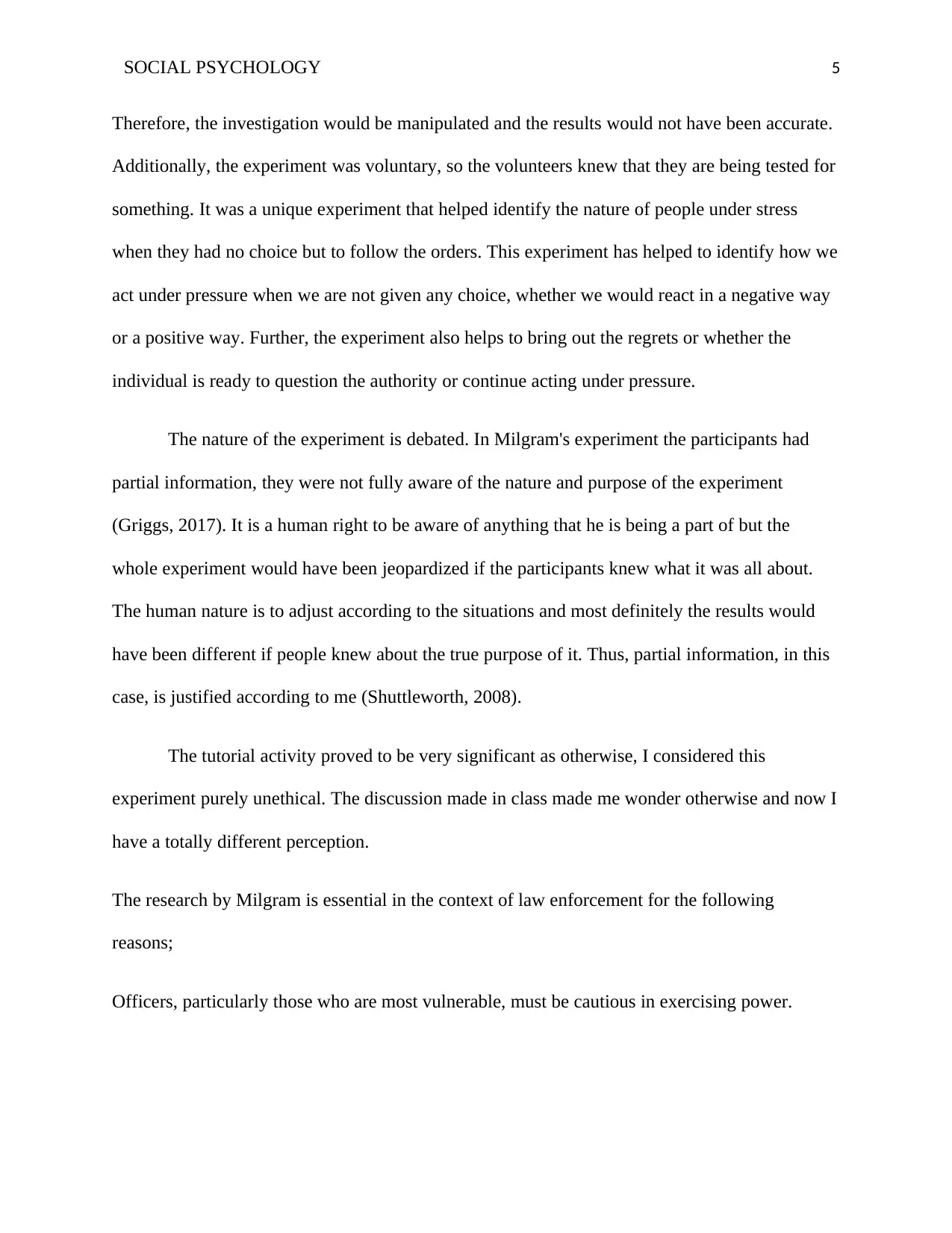
SOCIAL PSYCHOLOGY 5
Therefore, the investigation would be manipulated and the results would not have been accurate.
Additionally, the experiment was voluntary, so the volunteers knew that they are being tested for
something. It was a unique experiment that helped identify the nature of people under stress
when they had no choice but to follow the orders. This experiment has helped to identify how we
act under pressure when we are not given any choice, whether we would react in a negative way
or a positive way. Further, the experiment also helps to bring out the regrets or whether the
individual is ready to question the authority or continue acting under pressure.
The nature of the experiment is debated. In Milgram's experiment the participants had
partial information, they were not fully aware of the nature and purpose of the experiment
(Griggs, 2017). It is a human right to be aware of anything that he is being a part of but the
whole experiment would have been jeopardized if the participants knew what it was all about.
The human nature is to adjust according to the situations and most definitely the results would
have been different if people knew about the true purpose of it. Thus, partial information, in this
case, is justified according to me (Shuttleworth, 2008).
The tutorial activity proved to be very significant as otherwise, I considered this
experiment purely unethical. The discussion made in class made me wonder otherwise and now I
have a totally different perception.
The research by Milgram is essential in the context of law enforcement for the following
reasons;
Officers, particularly those who are most vulnerable, must be cautious in exercising power.
Therefore, the investigation would be manipulated and the results would not have been accurate.
Additionally, the experiment was voluntary, so the volunteers knew that they are being tested for
something. It was a unique experiment that helped identify the nature of people under stress
when they had no choice but to follow the orders. This experiment has helped to identify how we
act under pressure when we are not given any choice, whether we would react in a negative way
or a positive way. Further, the experiment also helps to bring out the regrets or whether the
individual is ready to question the authority or continue acting under pressure.
The nature of the experiment is debated. In Milgram's experiment the participants had
partial information, they were not fully aware of the nature and purpose of the experiment
(Griggs, 2017). It is a human right to be aware of anything that he is being a part of but the
whole experiment would have been jeopardized if the participants knew what it was all about.
The human nature is to adjust according to the situations and most definitely the results would
have been different if people knew about the true purpose of it. Thus, partial information, in this
case, is justified according to me (Shuttleworth, 2008).
The tutorial activity proved to be very significant as otherwise, I considered this
experiment purely unethical. The discussion made in class made me wonder otherwise and now I
have a totally different perception.
The research by Milgram is essential in the context of law enforcement for the following
reasons;
Officers, particularly those who are most vulnerable, must be cautious in exercising power.
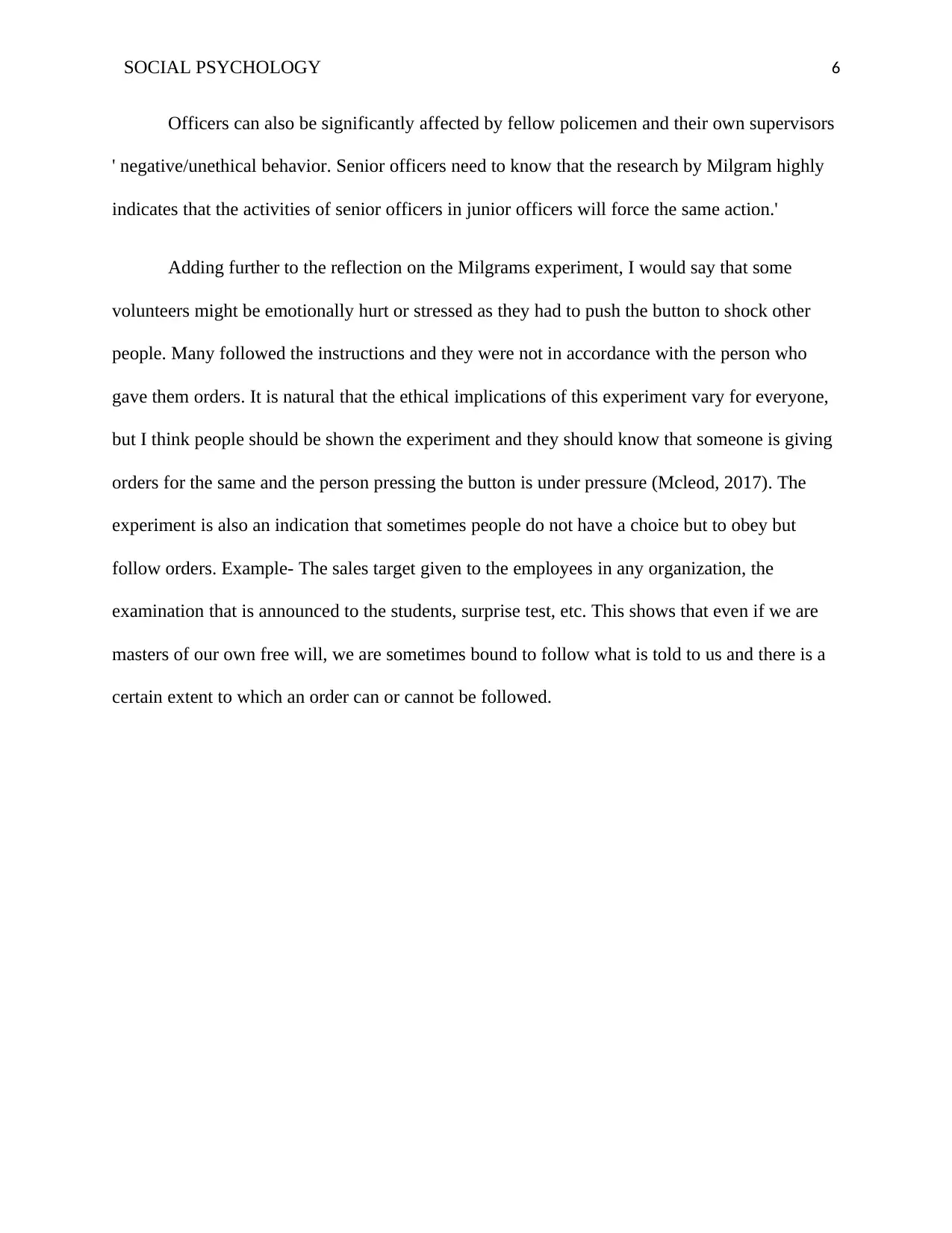
SOCIAL PSYCHOLOGY 6
Officers can also be significantly affected by fellow policemen and their own supervisors
' negative/unethical behavior. Senior officers need to know that the research by Milgram highly
indicates that the activities of senior officers in junior officers will force the same action.'
Adding further to the reflection on the Milgrams experiment, I would say that some
volunteers might be emotionally hurt or stressed as they had to push the button to shock other
people. Many followed the instructions and they were not in accordance with the person who
gave them orders. It is natural that the ethical implications of this experiment vary for everyone,
but I think people should be shown the experiment and they should know that someone is giving
orders for the same and the person pressing the button is under pressure (Mcleod, 2017). The
experiment is also an indication that sometimes people do not have a choice but to obey but
follow orders. Example- The sales target given to the employees in any organization, the
examination that is announced to the students, surprise test, etc. This shows that even if we are
masters of our own free will, we are sometimes bound to follow what is told to us and there is a
certain extent to which an order can or cannot be followed.
Officers can also be significantly affected by fellow policemen and their own supervisors
' negative/unethical behavior. Senior officers need to know that the research by Milgram highly
indicates that the activities of senior officers in junior officers will force the same action.'
Adding further to the reflection on the Milgrams experiment, I would say that some
volunteers might be emotionally hurt or stressed as they had to push the button to shock other
people. Many followed the instructions and they were not in accordance with the person who
gave them orders. It is natural that the ethical implications of this experiment vary for everyone,
but I think people should be shown the experiment and they should know that someone is giving
orders for the same and the person pressing the button is under pressure (Mcleod, 2017). The
experiment is also an indication that sometimes people do not have a choice but to obey but
follow orders. Example- The sales target given to the employees in any organization, the
examination that is announced to the students, surprise test, etc. This shows that even if we are
masters of our own free will, we are sometimes bound to follow what is told to us and there is a
certain extent to which an order can or cannot be followed.
⊘ This is a preview!⊘
Do you want full access?
Subscribe today to unlock all pages.

Trusted by 1+ million students worldwide
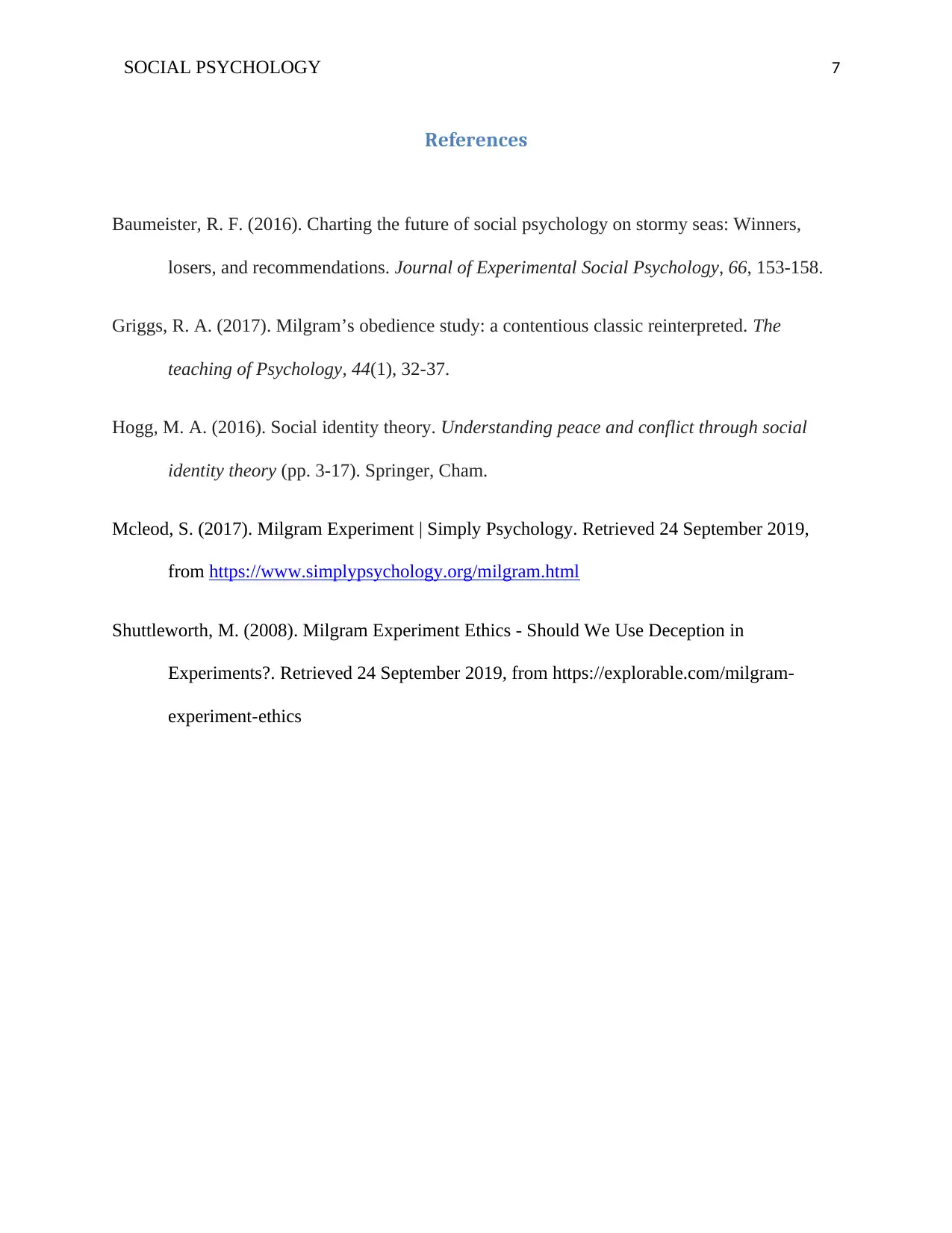
SOCIAL PSYCHOLOGY 7
References
Baumeister, R. F. (2016). Charting the future of social psychology on stormy seas: Winners,
losers, and recommendations. Journal of Experimental Social Psychology, 66, 153-158.
Griggs, R. A. (2017). Milgram’s obedience study: a contentious classic reinterpreted. The
teaching of Psychology, 44(1), 32-37.
Hogg, M. A. (2016). Social identity theory. Understanding peace and conflict through social
identity theory (pp. 3-17). Springer, Cham.
Mcleod, S. (2017). Milgram Experiment | Simply Psychology. Retrieved 24 September 2019,
from https://www.simplypsychology.org/milgram.html
Shuttleworth, M. (2008). Milgram Experiment Ethics - Should We Use Deception in
Experiments?. Retrieved 24 September 2019, from https://explorable.com/milgram-
experiment-ethics
References
Baumeister, R. F. (2016). Charting the future of social psychology on stormy seas: Winners,
losers, and recommendations. Journal of Experimental Social Psychology, 66, 153-158.
Griggs, R. A. (2017). Milgram’s obedience study: a contentious classic reinterpreted. The
teaching of Psychology, 44(1), 32-37.
Hogg, M. A. (2016). Social identity theory. Understanding peace and conflict through social
identity theory (pp. 3-17). Springer, Cham.
Mcleod, S. (2017). Milgram Experiment | Simply Psychology. Retrieved 24 September 2019,
from https://www.simplypsychology.org/milgram.html
Shuttleworth, M. (2008). Milgram Experiment Ethics - Should We Use Deception in
Experiments?. Retrieved 24 September 2019, from https://explorable.com/milgram-
experiment-ethics
1 out of 7
Related Documents
Your All-in-One AI-Powered Toolkit for Academic Success.
+13062052269
info@desklib.com
Available 24*7 on WhatsApp / Email
![[object Object]](/_next/static/media/star-bottom.7253800d.svg)
Unlock your academic potential
Copyright © 2020–2026 A2Z Services. All Rights Reserved. Developed and managed by ZUCOL.





